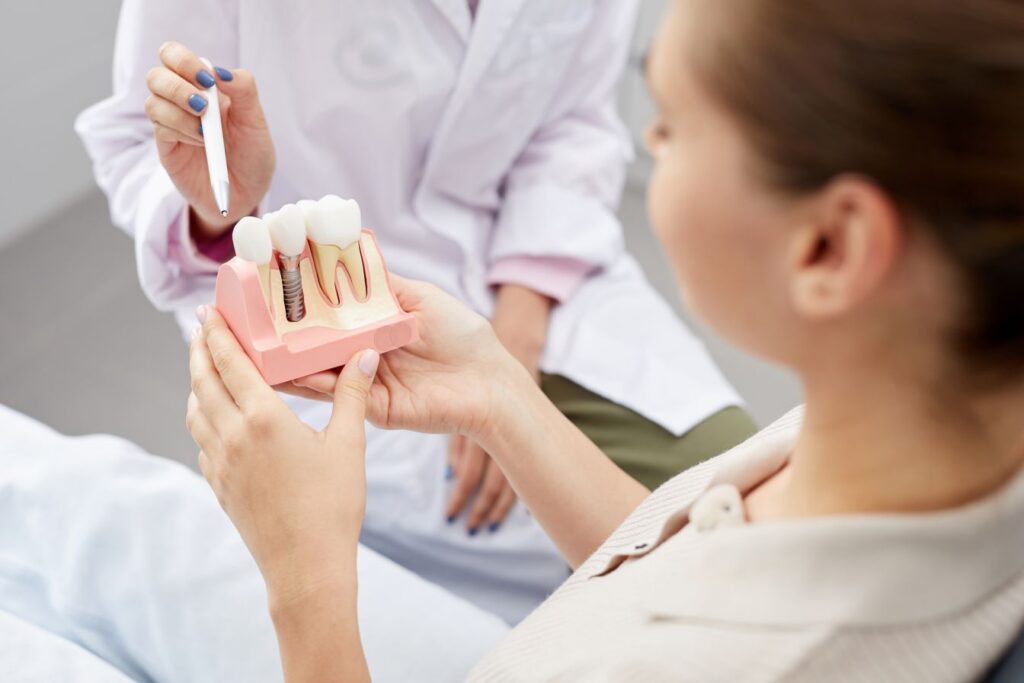
Today’s dental implants are more reliable than ever, boasting an impressive 95 percent success rate. But to stay out of that dangerous five percent category, you’ll need to take proper care of them. Here’s what you can do to protect your newly rebuilt smile from dental implant failure, and some important warning signs that could indicate that your prosthetics are in danger.
Proceed with Caution: Warning Signs Your Dental Implants are Failing
While in some cases, you may not be able to tell on your own that your dental implant is failing (it may only be noticeable by your dentist), one of the most obvious indicators that your prosthetic is in trouble is if it begins to feel wobbly or loose when you chew or talk. You may also feel pain, swelling, or infection around it, but not in all cases.
Risky Business: Things that Could Increase Your Odds of Implant Failure
Now that you know what to look for, it’s important to know a few things that could increase your risk of dental implant failure. These include:
- Bruxism (teeth grinding): When you put excessive pressure on your dental implants, this could loosen them or prevent them from successfully integrating with your jawbone. If you have bruxism, be sure to wear a mouthguard to protect your teeth and implants.
- Osteoporosis: This disease attacks the density of your bones, making it harder for your dental implants to properly anchor into the jaw.
- Radiation: If you are undergoing cancer treatment in the head or neck, the radiation used may prevent normal bone healing.
- Poor oral hygiene: Failing to care for your smile properly can cause gum disease and a condition called peri-implantitis that is similar to gum disease. Both of these conditions can cause your dental implants to fail but can be easily prevented by regular brushing and flossing.
- Bad habits: Smoking and using tobacco products can slow the healing process and make your dental implants more likely to fail. It is important to quit using tobacco products of any kind two weeks prior to your dental implant surgery and for as long as you can after.
- Infection: An infection at the site of your implant could cause it to fail, so be sure to take any prescribed antibiotics and keep the area clean by brushing and flossing regularly.
Next Steps: What to do If Your Dental Implants are Failing
If you notice that your dental implants are failing, don’t wait for the problem to get worse. Schedule an appointment with your dentist as soon as possible. They may offer dental implant failure and salvage treatment that can treat the cause of your failed implant and restore your prosthetic once your mouth has healed.
Remember, dental implant failure is very rare, but when it does happen, it’s important to get help from your dentist as soon as possible. Thus, be sure to take excellent care of your prosthetics and know the warning signs of potential problems so you can get help if needed.
About Our Practice
At Soliel Dental Mesquite, Dr. Vazquez and Dr. Aldana want you to enjoy your newly rebuilt smile for a lifetime. If you’ve got dental implants, keeping them in great condition is a team effort between you and your dentist. That’s why they’re happy to not only complete dental implant treatment right here in the office, but they also offer dental implant failure and salvage treatment, as well as preventive care appointments to monitor your oral health and keep your teeth (both natural and prosthetic) looking and feeling their best. To schedule a consultation for dental implants, implant salvage, or for a check-up and cleaning, please visit our website or call us today at 972-288-3200.
